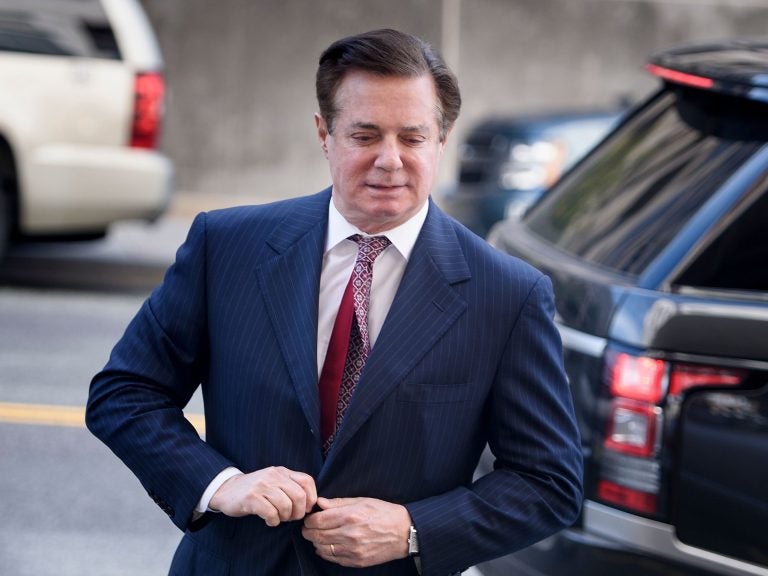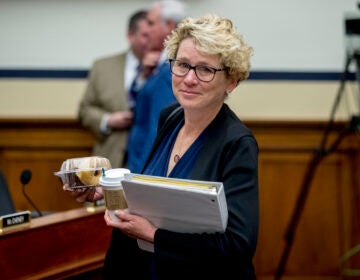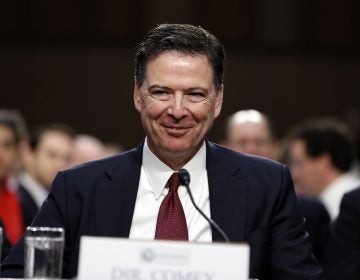Judge orders Paul Manafort detained amid witness tampering allegations

Paul Manafort arrives for a hearing at District Court in Washington, D.C., on Friday. A judge ordered him to jail ahead of his trial in connection with alleged witness tampering. (Brendan Smialowski/AFP/Getty Images)
Updated at 12:31 p.m. ET
A federal judge ordered Donald Trump’s former campaign chairman, Paul Manafort, to jail on Friday following allegations by prosecutors that he tampered with witnesses in his case.
“You’ve abused the trust placed in you six months ago,” said Judge Amy Berman Jackson. “I thought about this long and hard, Mr. Manafort. I have no appetite for this.”
But Berman Jackson said she could not turn a blind eye to the charges that Manafort had attempted to contact witnesses in his case after he was on bail for other alleged crimes.
The judge said Manafort had not commited physical violence, but rather had harmed the community.
“The harm in this case is the harm to the administration of justice, the harm to the integrity of the justice system,” Berman Jackson said.
Manafort was led out of the courtroom by security officers; he was not handcuffed. As he approached the courtroom door he waved to his wife, Kathleen, who nodded to him. Friends hugged Kathleen Manafort as her husband was taken out of court.
Jury tampering allegations
Manafort, along with a Russian associate, is accused of asking future witnesses in the case to lie to the jury. Prosecutors say he and a partner, Konstantin Kilimnik, contacted European witnesses to ask them to tell jurors in Manafort’s trial that lobbying work they did together was confined only to Europe and did not take place inside the United States.
Manafort is facing charges that include alleged money laundering, tax evasion, conspiracy and failure to register as a foreign agent.
In light of the witness tampering accusations, the special counsel’s office earlier asked a federal judge to consider revoking Manafort’s bail and ordering him into custody ahead of his trial this autumn.
Manafort has pleaded not guilty in his D.C. case, and another federal case brought against him in the Eastern District of Virginia.
His lawyer, Richard Westling, had asked the judge to lay out a clear order listing people Manafort should avoid, and send him home under the bail conditions he had negotiated with the special counsel’s office.
Berman Jackson said she could not agree because there could be no guarantee that Manafort would not reach out to others.
“This is not middle school,” she said. “I can’t take his cell phone.”
Manafort’s lawyers also requested the judge let him go while they appeal, but she declined.
Ordering Manafort into custody compounds the legal pressure he is facing and represents another step down from the position he once enjoyed as Trump’s campaign boss and, before that, a longtime influence-broker.
Counsel to dictators
Manafort spent decades as a powerful insider; he told a congressional hearing in 1989 that “the technical term for what we do and what law firms, associations and professional groups do is lobbying,” adding, “some people might term it influence peddling.”
Manafort was testifying about his role in a scandal at the Department of Housing and Urban Development during the Reagan administration. It wasn’t the only time that Manafort’s business practices have come under scrutiny.
His lobbying firm, Black, Manafort, Stone and Kelly — the Stone was Roger Stone, who is also reportedly under investigation by the special counsel — was included in a 1992 report by the Center for Public Integrity titled “The Torturers’ Lobby.”
It cited the group’s work on behalf of repressive governments in Nigeria and Kenya, the UNITA rebels in Angola, and a group with ties to Philippine dictator Ferdinand Marcos.
Riva Levinson was hired by Manafort in the 1980s, becoming, she says, his “third world traveler of choice.” During her job interview in the summer of 1985, she promised Manafort “there was no place I wouldn’t go. And Paul took full advantage, and there was no place he wouldn’t send me.”
That included Somalia, where Manafort’s firm was trying to sign a contract with dictator Siad Barre, accused of human rights abuses. Levinson recounted the episode in her book Choosing The Hero.
“I asked Paul if he wanted this guy as our client,” Levinson said. “Paul’s response to me at the time is, ‘Riva, we all know he’s a bad guy; but he’s our bad guy.'”
In the early 2000s, Manafort was hired as a political consultant for future Ukrainian President Viktor Yanukovych, a close ally of Russian President Vladimir Putin. Manafort defended his work for Yanukovych in a 2017 interview on CNN:
“You will see if you do any fact-checking that I was the person that negotiated the framework which is based upon which Ukraine is now a part of Europe. That was my role. That’s what I did, and when it was completed, I left.”
Prosecutors say that Manafort’s work for Ukraine also had a clandestine aspect; according to one indictment, Manafort recruited a number of European political figures to advocate on behalf of Yanukovych and Ukraine, apparently independently. Actually their work was being coordinated by Manafort and underwritten by the Ukrainian government.
Longtime Republican
Manafort’s political skills in the United States were of more interest to Trump. He helped Gerald Ford secure the 1976 nomination and later worked for Ronald Reagan. He was hired by Scott Reed, then-presidential nominee Bob Dole’s campaign manager, to help run the 1996 Republican National Convention.
In an interview with NPR after Manafort signed on with Trump in 2016, Reed noted Manafort has an apartment at Trump Tower in New York.
But more importantly, he and Trump were peers.
“He’s the one person in the room that calls him Donald,” Reed said. “It’s not ‘Mr. Trump.’ It’s ‘Donald.’ ‘Come on, Donald; we’ve got to do the right thing here.’ And I think that’s an important part of managing a campaign — to be able to have that type of relationship with the candidate of trust and, you know, knowledge.”
Trump had previously hired Manafort back in the ’80s to lobby on gambling and real estate issues. Even though Levinson had her disagreements with Manafort, she called him a master strategist.
“He can hover above all of the moving parts, and intuitively he understands how to put them together,” she said. “And he taught me how to not get distracted from the clutter.”
Within the famously disorganized Trump campaign, not getting distracted by the clutter was an invaluable skill. But Manafort’s tenure at Trump campaign was short-lived.
He was ousted by Trump in mid-August, after a little more than two months on the job as chairman, when reports of his involvement with Yanukovych and the possibility that he received an illegal payment from Yanukovych’s party drew intense media scrutiny.
“My father just didn’t want to have the distraction looming over the campaign,” said Eric Trump, the then-candidate’s son, in a Fox News interview.
9(MDAzMzI1ODY3MDEyMzkzOTE3NjIxNDg3MQ001))




